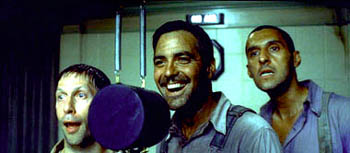![[Metroactive Movies]](/movies/gifs/movies468.gif)
[ Movies Index | Show Times | San Jose | Metroactive Central | Archives ]
Southern Odyssey
The Coen brothers remake a Greek epic as a 1930s comedy journey in 'O Brother, Where Art Thou?'
By Richard von Busack
A LOT OF UNEVEN MOVIES have been carried by their soundtracks, but O Brother, Where Art Thou?, the new Coen brothers feature, surpasses them all. It's a rocky, episodic movie rarely deeper than a hillbilly caricature. And yet it's a hard movie not to like.
The title comes from a Preston Sturges joke about earnest filmmaking in the 1940 feature Sullivan's Travels. (The only other reference to the Sturges film is a scene of a chain gang filing into a movie theater.) The story is based very loosely on Homer's The Odyssey and set in Mississippi during the Depression.
George Clooney plays the hero, Everett Ulysses McGill, a con artist with a huge vocabulary. Unlike the Greek hero--that man of many twists and turns--this Ulysses is easily outwitted. Still, Everett's two fellow escapees from a chain gang, Pete Hogwallop (John Turturro) and Delmer O'Donnel (Tim Blake Nelson), follow his supposedly wise lead.
McGill and his two companions are heading not to Ithaca but to a valley where some unspecified treasure awaits; they have to get there before the Tennessee Valley Authority floods the area. Even this plot is abandoned, in time.
Our Ulysses goes to a radio station where he and his men make a few dollars recording the old folk song "A Man of Constant Sorrow." Clooney, pop-eyed but deadpan, mimes the appeal of old-timey music and the way plainspoken men and women used it to show their poetic, exuberant or tragic sides. This Ulysses and his bandmates, who call themselves the Soggy Bottom Boys, have made a hit and don't realize it.
Among the gods influencing our trio is Pappy O'Daniel (Charles Durning, buttery and corrupt), a governor facing an election. His opponent is a reformer, Homer Stokes (Wayne Duvall), in cahoots with the Ku Klux Klan. This may be a dumb film at times, but the Coen brothers remember something that's usually forgotten: how some populist, reformist movements of the last century sometimes had a nativist, racist streak.
Even the involvement of the Klan as monsters in this Odyssey is inspired. Witness especially the Klan rally staged as an homage to the close-order drill of the winged monkeys in The Wizard of Oz. A one-eyed brute, the Polyphemus character (played by John Goodman) turns out to be an actual Cyclops--an official in the Klan.
A bank robber named George "Baby Face" Nelson (Michael Badalucco) enters the hero's lives for a moment. The joke is that Nelson hates his nickname and is bipolar to boot. He crashes after every robbery into a dejected heap. Nelson only becomes mythic later, in a torch light procession that escorts him to jail.
The mob sings accompaniment to a recording of "Indian War Whoop" by Hoyt Ming and his Pep Steppers. I'm presuming that the film's music duo--T-Bone Burnett and Carter Burwell--heard that Hoyt Ming track the same place I did, on the Harry Smith-edited Anthology of American Folk Music, re-released last year by Sony. O Brother, Where Art Thou? is like the music video for the Smith Anthology, and that's meant as a compliment.
THE FILM is practically a musical, with a fine selection of songs from "the old weird America," as critic Greil Marcus put it. The soundtrack music is as important to the essence of O Brother, Where Art Thou? as Cab Calloway used to be to the spirit of a Betty Boop cartoon. The songs makes the Coens' blackout-style scenes seem smarter. You have the impression in this film of good ideas jingling around like a pocketful of change.
The theme song is the original version of "The Big Rock Candy Mountain," and maybe the Coens had nothing grander but candy in mind. If O Brother, Where Art Thou? is about anything, it's about the South as a musical vortex of blues, gospel, vocal and folk music. The region's musical richness changed a flat, harsh landscape into a golden land of myths.
The Coens, however, never really match these musical myths with the story of Ulysses and his odyssey. And this Odyssey misses its Telemachus, its Nausicaa--and the Penelope character (Holly Hunter) turns out to be a faithless shrew.
Throughout all their films, the Coen brothers have struck an uneasy balance between mocking and celebrating rural folk. They've gone overboard with the mocking here. O Brother, Where Art Thou? can be sour and mean. Still, the music that lilts through this film patches up everything, from the holes in the story to the sometimes-contemptuous way the Coens treat the characters.
[ San Jose | Metroactive Central | Archives ]
![]()

Men of Constant Sorrow: Tim Blake Nelson (left), George Clooney (center) and John Turturro become unlikely singing heroes in 'O Brother, Where Art Thou?'.
O Brother, Where Art Thou? (PG-13; 106 min.), directed by Joel Coen, written by Ethan and Joel Coen, photographed by Roger Deakins and starring George Clooney, John Turturro and Charles Durning, opens Friday at selected theaters valleywide.
From the December 29, 2000-January 3, 2001 issue of Metro, Silicon Valley's Weekly Newspaper.